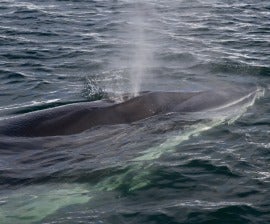-

A minke whale. PilipenkoD/istock
The three ships taking part in Japan’s North Pacific whale hunt returned Tuesday with the remains of 43 minke whales and 134 sei whales on board. Hunting whales for commercial purposes is banned by the International Whaling Commission’s ongoing moratorium in effect 1986, yet Japan continues to defy this ban by claiming its hunt is done for scientific research.
Humane Society International, an outspoken critic of the Japanese whale hunt, issued the following statement through its president, Kitty Block:
“My heart sinks each time the Japanese fleet returns to port with these magnificent animals rendered into blocks of meat pre-packed for the super-markets. Japan continues to wrap its whaling activities in the disguise of science and uses extraordinary sophistry to try to confuse the global public. But make no mistake, this is about killing whales for commercial purposes, something clearly prohibited by international law.
“The International Whaling Commission has not asked for this research, and its Scientific Committee has criticised the North Pacific research program. Astonishingly, Japan now says it is researching sustainable catch, meaning that the entire point is to kill more of these magnificent, protected creatures.”
Facts:
- In 2014, the International Court of Justice rejected Japan’s claim that its whaling programme in Antarctica (Southern Ocean) was for scientific purposes and ordered an immediate halt to the program. Japan initially indicated that it would obey the ruling, but then announced it would resume whaling in the Southern Ocean with a new whaling programme that – in its view – would take into account the detail of the ICJ’s ruling. It also briefing halted its North Pacific programme and then resumed with a new programme there, too, which included an increased take of sei whales.
- The latest catch confirms that Japan is focusing increasingly on the larger sei whales in the North Pacific, which render more meat to be sold.
- The International Convention for the Regulation of Whaling adopted in 1946 in theory allows the IWC member nations to take whales for scientific research – but the treaty members never intended to support long-term commercial catches.
Media contact: Raul Arce-Contreras, rcontreras@humanesociety.org, +1 301-721-6440
